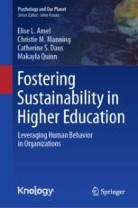
About this book series
The book series Psychology and Our Planet comprises edited volumes, monographs, and briefings that focus on the interaction between mental process and the environment. At present environmental, population, and conservation psychology represent broad areas of practice that tend to have a disaggregated publication record. While the work in past builds on a broad base of research, synthesis of these papers tends to only appear in service to a specific research publication, and more importantly, is seldom synthesized in ways that are useful to academic training and policy advancement. The series seeks to redress that gap by providing a forum and meeting place for psychologists from across disciplines to advance the exchange ideas, and, where appropriate, provide opportunities for collaboration. The aim of the series is to publish books on the many dimensions of how people conceive themselves within the biological and cultural systems that shape the world, and to expand the full range of human relationships to the conditions that have created the world we live in today, and the decisions that will guide anthropogenic impacts on the planet’s future.
Topics covered in this series include:
• Synergies between human mental health and the ecology of the natural environment, and the psychological consequences of high population density.
• The role of mental processes and human behavior in advancing a thriving biosphere on which all life depends.
• The understanding of reciprocal relationships well-being related to the design of built spaces, landscapes and natural environments.
• The reciprocal relationships between environmental conditions, be that the natural or built world, and the shaping of mental process.
• The synergies between human mental health and ecological systems.
• The psychological consequences of high population density of the environment in mental development and mental health.
Psychology and Our Planet welcomes book proposals representing the broad interest of the interdisciplinary and international focus of the series, and is particularly excited to receive proposals that address aspects of systems and habits that, at scale, may be able to describe and reverse the negative sequelae that are now placing people and populations in harm’s way.
- Electronic ISSN
- 2662-1924
- Print ISSN
- 2662-1916
- Series Editor
-
- R.D. Deshpande
Book titles in this series
-

-
Zoos and Aquariums in the Public Mind
- Editors:
-
- John Fraser
- Joe E. Heimlich
- Kelly Riedinger
- Copyright: 2023
Available Renditions
- Hard cover
- Soft cover
- eBook

-
Disruptive Environmental Communication
- Authors:
-
- Christian A. Klöckner
- Erica Löfström
- Copyright: 2022
Available Renditions
- Hard cover
- Soft cover
- eBook

